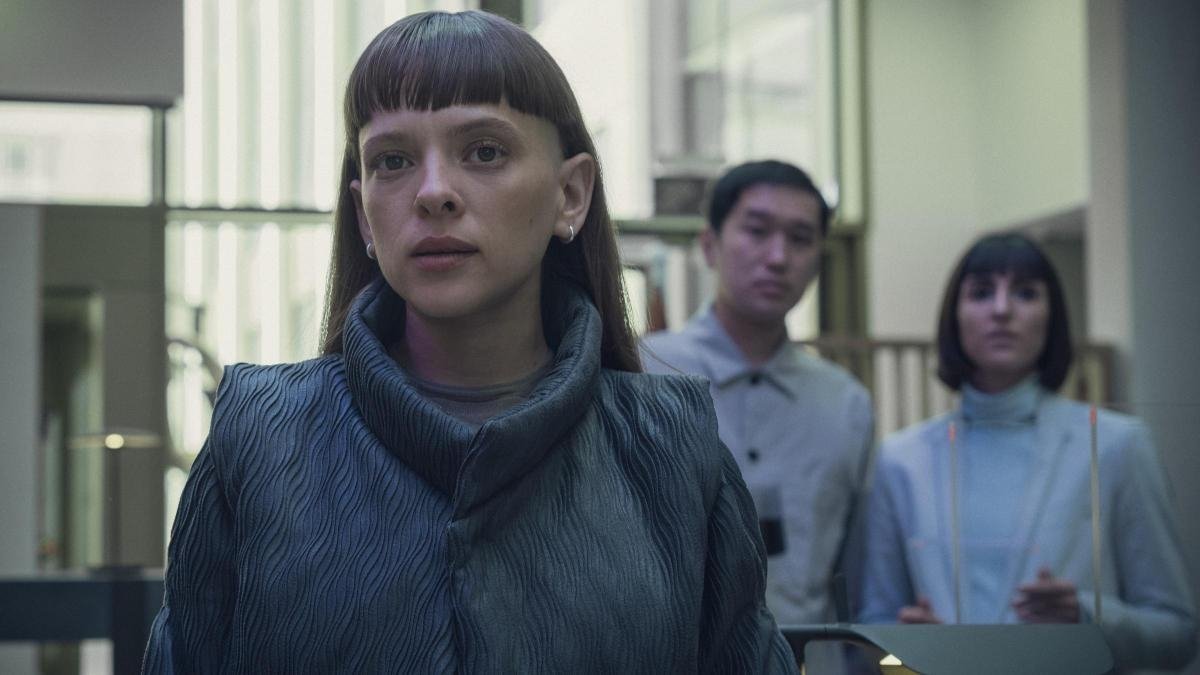This review is on the eight-part Netflix series “Bodies.” It has been a while since this was released on the streaming platform, but this review is really intended for readers who have already seen it. To look properly at its themes, it is necessary to reveal plot issues that take the viewer all the way up to the end of the final episode. As such, this review necessarily contains spoilers that would mar a first-time viewing of the series. I, therefore, recommend that those who might like to see this series turn away from this piece after the next two paragraphs, which give a flavor of what it is about, and after that, I start to reveal important details.
Detective series, however compelling, have become so commonplace that it is challenging for them to do something new. However, this series achieves that by being a detective story of a highly unusual type. The story revolves around four London detectives, each separated by at least a generation, involved in the same case. A naked body of the same victim of a shooting turns up on Longharvest Lane in 1890, 1941, 2023 and 2053 – hence the “bodies” of the series title. Unaware of the strange origin of the body or initially of the connection with the other time periods, each of the detectives either attempts to solve what they regard as a crime or are caught up by it in other ways.
It is commendable that each of the four detectives is drawn with sufficient individualized characteristics and traits, and the action in each of the periods is not rendered repetitive. Alfred Hillinghead, played by Kyle Soller, the detective of 1890, is an upright Victorian gentleman whose ethics are tested by circumstance. Charles Whiteman, played by Jacob Fortune-Lloyd, the detective of 1941, is an outwardly charming, corrupt officer whose fundamental character remains hidden for a time. Shahara Hasan, played by Amaka Okafor, the detective of 2023, is a dedicated yet highly empathetic police officer who particularly cares for troubled youths. Lastly, Iris Maplewood, played by Shira Haas, is the zealous servant of a new authoritarian regime that will rule in London in the future.
Detective to science fiction
The series eventually begins to morph from an attempt to solve or deal with a supposed crime to what has caused it. The series comes to reveal that the victim of the shooting is the same man, a scientist from 2053 named Gabriel Defoe, played by Tom Mothersdale, whose body, at the time he is shot, is spliced by a time machine he has invented and this explains his appearance in the different time periods. It does, of course, mean that the detectives of the earlier periods are unable to solve the crime, while, in the case of Maplewood, she turns out to be the one who kills the victim, and as she does so, in the line of duty, her shooting is not a crime anyhow. As such, “Bodies” has now become more of a science fiction than a detective drama.
As the issue of the crime itself recedes, the central storyline more clearly emerges. It settles on a troubled youth of 2023, the boy Elias Mannix, played by Gabriel Howell, who has been the victim of gross emotional neglect. It turns out, though, that if he sets off a nuclear bomb hidden in the heart of London, his fate in the future will be to become Commander Mannix, played by Stephen Graham, the savior of the British nation, as he will also heal the traumatized society into a more cohesive one through an authoritarian state in which all are ensured “know you are loved” (KYAL). Furthermore, this older Mannix will then time travel back to 1889, steal the identity of Sir Julian Harker and form a conspiratorial cult dedicated to creating this future society and, which will secret the nuclear device. The older Mannix also reaches out to the younger Mannix to convince him of his need to detonate the bomb through the use of recordings he makes in his old age in 1941 and leaves for him.
Positive elements in drama
As befits a good thriller, the audience is drip-fed titbits of information to keep them guessing as to what will happen until the end, and there are some brilliantly designed, highly unexpected twists within it. The best must be the revelation of Hasan’s superior, the chirpy and personably Barber, played by Michael Jibson, as an infamous character in the conspiracy. It also turns out that Barber is Elias’ father and great-grandson. Earlier in the series, I assumed that any familial link between the two would have leaped an imagination much greater than mine. There is also the revelation that Polly, the daughter of Hillinghead, played by Synnove Karlsen in her younger and Greta Scacchi in her elder versions, is still alive in wartime London. However, this once pleasant, driven young woman now turns out to also be part of the cult and kills a young girl in the temporary absence of Whiteman. This twist is highly disturbing.
A great piece of suspense surrounds Hasan. Having been told by the young Elias that “you’re the one that’s going to make me do it,” the viewer is left wondering how the decent and compassionate Hasan could come to compel Elias to commit mass murder in London, especially as there is such a short window of time within which she could be corrupted to the cult. The revelatory twist is that it is when she naturally expresses her maternal love to her son over the phone with Elias nearby, just after he has been rejected by his own mother, that he is so overwhelmed by the unfairness and hurt of his situation that he remotely sets the bomb off. That, too, is a brilliant twist in a fantastically rendered, highly emotional scene.
As a thriller, the tone of the series is understandably tense and often grim, though it is, on occasion, brilliantly lightened by touches of humor. One of my favorites is the news in 2053 that a cybercrime gang was “targeting local millennials since they’re getting a little long in the tooth these days,” mocking the idea that what, for us, is the most technologically savvy generation will, in turn, become as technologically vulnerable as my generation is now.
The series also positively undermines certain stereotypes. For instance, it opens with a strange kind of explosion in which a British Muslim youth seems to be involved. However, the series inverts this stereotype of the bomb-setting Muslim by showing us that he has nothing to do with it and making the Muslim officer, Hasan, the true key figure in saving London from its destruction.
It needs to be noted that there are some minor problematic issues, such as a lack of blackout precautions in 1941 wartime London. There is also a buried brick that is etched upon it, which provides the detectives from the different time zones with a very rudimentary form of communication. However, why Hasan should be impelled to look for it is unclear. There is also the major problematic issue of why Mannix was never blamed for the bomb and was allowed instead to build his career upon it, seeing that Hasan survives and clearly witnesses him setting it off. However, I shall pick up on my major issue with the series after examining a few of the themes of “Bodies.”
Themes
One interesting theme raised by the series is that of utopias. It demonstrates that one person’s utopia is another person’s nightmare. We see this in the number of people who refuse to conform to the new KYAL regime, though Mannix’s explicit motivation has been to build a society for all. It is even more intriguing that in the past, Mannix was able to assemble such a loyal cult following amongst people who will never live long enough to see the utopia they wish to build brought about. This shows the dangerous degree that wishful fantasist thinking has in cultist movements.
The series looks at the question of the nature of love. Love is an issue for all of the main characters, including Mannix. Yet until his final realization near the end, Elias regards love as a commodity that can be secured through lies and manipulation. On the grand scale, that is the case in founding his KYAL utopia on a traumatized people whose trauma Mannix himself has authored. On a smaller scale, it is reflected in his manipulation of Polly into marriage with him and making her a key member of his cult. Maddox’s manipulation of emotions contrasts with the genuine love expressed by the detectives for different individuals, which motivates the better sides of their characters.
A further theme is raised by Mannix himself. In the future, he reminds Maplewood of the “saying” that “one skilled scientist is worth more than an army” and gives Oppenheimer as an example. The series offers proof of the assertion. Without the scientific advance of a time travel machine brought about through the work of Defoe, it would have proved impossible to correct the carnage that Mannix unleashes on London. This, however, leads to the question of time travel and my greatest problems with this series.
Issues raised by time travel
The time travel issue rests on whether time is immutable or whether the past can be altered to change the future. When following his revelation as the murderer of her father, Mannix tells Polly, “You’ve no choice” and that “nothing can change. Everything depends on it” to try and keep her with him; his statement can be regarded as ambiguous in that he may be a true believer in determinism, but it is also possible that this is part of his gaslighting Polly into performing the role he has set for her. For in 2053, Mannix seems extremely concerned that that time can indeed be changed. He tells Maplewood that he fears if Defoe and his fellow anti-KYAL conspirators travel back to the past, “they can erase our progress; destroy our whole world.”
The time travel issue is part of a larger question as to whether human beings are free-willed or whether all that they do is determined. In the series, the determinist argument is set out with great clarity by the victim of the piece, Defoe. Defoe tells Maplewood that “free will does not exist.” He explains that this is because a single action “depends on the millions of factors and forces that have already happened to you that you’re blissfully unaware of.” Free will is, therefore, an illusion.
In the case of a sequence of events, their immutability is even clearer. As each event is the direct cause of the subsequent event, should one of these events be changed, the whole subsequent line of cause and effect must necessarily be irreversibly broken. That is, if A causes B and B causes C and C causes D and so on, then if someone is to change C to, for instance, Γ (gamma), then it is impossible that D will naturally follow in sequence. It is also impossible that even if time travel could occur, a person from D or later could go back and alter C, for in doing so, D to Z could not now occur, and this person could not, therefore, travel back from there.
This leads to the problem with time travel dramas in which one or more people journey to the past. The creators of these dramas are faced with two choices. The first is to accept logic and, thus, the immutability of time. This line was taken with the 1984 raw action film “The Terminator” and the brilliantly comedic 1989 film “Bill and Ted’s Excellent Adventure.” In these films, the time travelers help to create the future from which they come back – leaving a logical, albeit highly unusual, chain of events. The other is to allow those who have traveled back in time to alter the past to ensure a better future. Nearly all time travel stories allow for this, such as sequels to the aforementioned films, all of the “Back to the Future” films and the blockbuster Marvel movie series. Indeed, the dramatic need for an ability to alter time is due to these stories being otherwise necessarily dull in that the outcome would be evident from the start. It is the case that the only reason even a film like “The Terminator” can keep dramatic suspense is because we are unsure till the end what kind of time travel film it is. Nevertheless, the necessary violation of the fixed logical sequence of cause and effect needed to achieve the kind of storytelling with malleable past time travel stories irritates me intensely. “Bodies” leaves the viewer in suspense as to what type of time travel drama it is to be until quite late, but once it was clear to me that it would allow for malleable time, it left me with a deep feeling of disappointment.
It also necessitates using “Bodies,” that incredibly silly plot device by which people, the past having been changed in a way that prevents their existence or presence in a particular place, literally vanish into thin air. This happens with the young Elias and the future Hasan. Yet, despite an enormous change in the past with a myriad of knock-on effects, the series ends with events just as at the beginning. It makes one flabbergasted as to how Hasan’s career could have been identical, and I mean identical, not similar, up to this point, even though her superior, Barber, with whom she has such a close connection, cannot now exist.
Yet, allowing for this to be fiction and allowing that fiction does not have to be logical, there is another problem with past-altering time travel, which has been raised by the genre itself. It is a moral one. For if people are deleted from existence with an alteration of a timeline, even if a hero or heroine goes to the past to make a better future, those that existed in the supposedly worse future version, should they have come into existence subsequent to the point in the past that is to be changed, will cease to exist. Viewed in this way, the actions of Hasan are as immoral as those of Mannix. In restoring a past that is one of contentment to her, Hasan eliminates the futures of millions of people who exist in the reality to which she originally belongs. They have no more say in this decision than the victims of Mannix’s bomb. And Mannix also believes that his bomb will pave the way for a better future. Yet, we know Mannix at least comes to feel remorse for “the souls” he has “destroyed.” There is nothing in the series to suggest Hasan feels the same way. Indeed, she cannot, for she has conveniently also wiped her memory of the actions in erasing the events themselves.
For this reason, despite the many positive elements and interesting themes in this series, its seriously flawed central plot device means I cannot rate Bodies as highly as I would otherwise have liked. So, I feel I can only give “Bodies” a score of 2.75 out of 5.




















































Be First to Comment